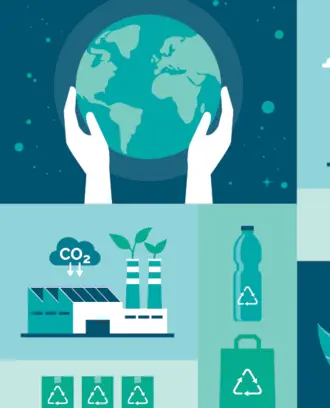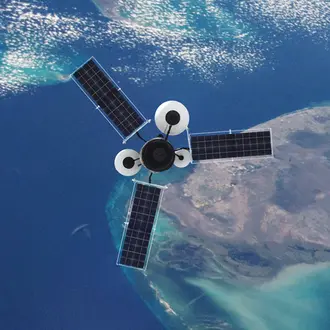When Rubén Lozano Aguilera, MBA ’13, submitted his MIT Sloan admission application, he stated that his ultimate goal was to work on sustainability at a major corporation—he’s reached that goal in a big way.
Rubén Lozano Aguilera, MBA ’13, Senior Product Manager at Google Maps
Before MIT, Rubén was part of a Microsoft team bringing ecommerce to people across the globe. That’s when he realized that the opportunities and challenges developing countries were facing in adopting and embracing new technologies extended far beyond the technical realm. “From my perspective, technology is a powerful tool, but ultimately, it remains just a tool,” he reflects. “Human, political, social, and economic factors all need consideration when introducing tech to people, including future implications.”
Rubén discovered like-minded professionals at MIT and within the MIT Sloan sustainability community. “MIT Sloan felt a bit more relaxed, more informal, more nerdy, more human—more interested in substance than pretense,” he says. “And most importantly, I felt I belonged. I believe MIT Sloan has a much higher threshold for people who don't fit the mold—who are not your classic b-school students. For me, that was magical, I felt a humble intellectual curiosity permeating the atmosphere and I loved it.”
On campus, Rubén was quick to take on leadership roles—as president of the MIT Sloan Pride Club, an MIT Sloan Ambassador, and director of content for the MIT Sustainability Summit. As an MIT Public Sector Service Grant recipient, Rubén conducted field research in Africa, contributing to an SEID project focused on solving a human resource challenge for a low-cost energy provider in Tanzania.
Rubén joined Google in 2018, after stints at Samsung in Seoul and at Amazon in Seattle, across strategy and product management. As a senior product manager for Google Maps, he initially focused on helping drivers maneuver the new realities of navigating urban environments. But it wasn’t long before he pitched a sustainability-specific product feature for the app.
As with any new idea, Rubén had to advocate persistently for his product feature. In 2020, after CEO Sundar Pichai made a public announcement about Google's commitment to help 1 billion people live more sustainably by using the company’s core products, like Search and Maps, Rubén knew his time had come.
He explains, "I had already identified pollution as a key challenge for the future of transportation in urban areas as part of my long-term strategy. So when Sundar announced Google's commitment, I knew I had the perfect opportunity to make my proposal a reality."
Mapping out eco-friendly routes
Sustainability has been a priority for Google for a long time—starting with decarbonizing its business and increasingly investing in helping others—but there was still opportunity to help people around the world make sustainable choices in their daily lives using Google's products, Rubén says. In early 2021, Rubén and his team got the green light to launch a new product in Maps, eco-friendly routing—an algorithm that not only prioritizes getting drivers to their destination as quickly as possible, but also optimizes for lower fuel consumption, saving people money on gas while simultaneously reducing CO2e emissions.
Of course, as with any new initiative, the project required a lot of foundational research, usability studies, experimentation, technical partnerships, and continuous learning to understand what it meant to deliver a high-quality product in this space that users would embrace. During the entire process, Rubén found himself relying on what he learned at MIT Sloan.
“One of the most important lessons was learning to see problems as dynamic systems, in which multiple factors influence their ups and downs,” he says. “And also realizing that many of those factors involve humans, so exploring why we behave the way we do is key. We’re both rational and irrational beings”.
Rubén highlighted a class taught by Andrew W. Lo (Charles E. and Susan T. Harris Professor; Professor, Finance) that introduced the adaptive market hypothesis, a novel multi-disciplinary framework for tackling complex problems. “After learning about how evolutionary biology and neuroscience can help explain how humans make decisions in financial markets, it wasn’t a big leap for me to apply the same mindset to climate change”.
For Rubén, one of the most exciting aspects of the new product is that his team can actually measure its impact. By tracking both the route that Google Maps would have recommended without the innovation, as well as the one the driver ended up choosing, they can tally up the differences and produce a good estimation.
“As of the end of Sep 2023, we estimated that our efforts have helped prevent 2.4M+ metric tons of CO2e emissions since launch—equivalent to taking approximately 500K fuel-based cars off the road for a year. All of that with a software update on a mobile app!”
But Rubén anticipates an even greater impact as his team expands eco-friendly routing coverage and collaborates with partners like the National Renewable Energy Lab (NREL) and transportation leaders to empower people worldwide to travel more sustainably. From suggesting public transit or walking options alongside comparable driving routes to simplifying EV ownership by addressing EV charging concerns, the goal is making sustainable travel the easiest choice, no matter where people are at in their sustainability journey.
What are Rubén’s three big takeaways from the Google Maps project?
- When the right opportunity arises, be ready.
- Repetition, repetition, repetition. If you have an idea you believe in and can prove its effectiveness–keep proposing it; make sure people know this idea exists. When you secure the green light, that's just the start. Your goal is to continually champion your idea, building excitement across a widening audience. Even though it may seem like you're repeating yourself, keep in mind that each time you share your message, it will be with a new audience in a different context.
- Respect is key. At Google, our product philosophy is to follow the three respects: Respect the user, respect the opportunity, and respect each other. When working on a sustainability product, this is even more critical. Be empathic for the users, all of them–as they may be at very different stages in their sustainability journey and their circumstances and life realities are very nuanced–especially when your audience is global. Remain laser-focused on addressing the core problem of climate change–reject any hint of greenwashing, as it will most likely hurt the cause. But, most importantly, bring the best out of everyone in your team, as more likely than not, they are deeply committed to the cause. And frankly, this problem is so immense we need everyone in.



